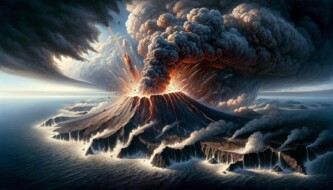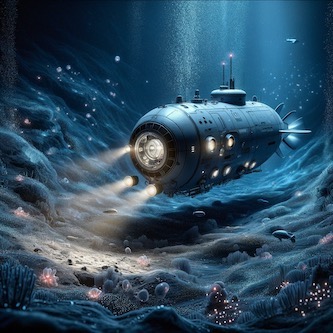Last week, a volcano on a small island in Japan erupted very strongly. Rocks flew high into the air and fell into the sea. This island is called Niijima and it’s a new island that appeared only 10 years ago. It’s far away from Tokyo, the big city in Japan.
People saw the eruption in a video made by the coast guard. It showed smoke and rocks shooting up and then falling into the water. Japan has a lot of earthquakes and volcanoes because it’s on the “Ring of Fire.” This is a place in the Pacific Ocean where the ground moves a lot. The eruption was not dangerous for people living nearby, but it shows that Japan needs to watch its volcanoes carefully.
Japan has more than 100 volcanoes that are still active, which means they can erupt. Eruptions happen often in Japan. It’s not very common for a new island like Niijima to be made by a volcano. Scientists are studying the island to learn more about how the Earth changes. Japan is trying to learn more about its volcanoes to keep people safe.
Original news source: Watch: Volcano in Japan spews ash, rock 200m into sky (BBC)
Listen
Slow
Normal
Fast
Group or Classroom Activities
Warm-up Activities:
– News Summary
Instructions: Divide the class into pairs. Give each pair a copy of the article. One student in each pair will be the “news reporter” and the other will be the “listener.” The news reporter has 2 minutes to read the article and summarize the main points to the listener. After 2 minutes, the listener must summarize what they heard from the news reporter. Then, switch roles and repeat the activity.
– Word Association
Instructions: Write the word “volcano” on the board. Ask the students to brainstorm as many words as they can that they associate with volcanoes. Give them 2 minutes to come up with their words individually. Then, have the students share their words with a partner. Afterward, have a class discussion and write the words on the board.
– Sketch It
Instructions: Divide the class into pairs. One student in each pair will describe the eruption from the article to their partner, while the other student listens and tries to sketch what they hear. Afterward, have the students compare their sketches and discuss how accurate they are.
– Vocabulary Pictionary
Instructions: Write a list of vocabulary words from the article on the board (e.g. eruption, volcano, rocks, coast guard). Divide the class into teams. One student from each team comes to the front of the class and chooses a word from the list. They have 1 minute to draw a picture that represents the word, while their team tries to guess what word it is. The team that guesses correctly gets a point.
– Future Predictions
Instructions: Have a class discussion about what might happen in the future with the volcano on Niijima. Ask the students to make predictions about whether the volcano will continue to erupt, if the island will grow bigger, or if any other changes will occur. Encourage them to use language such as “I think,” “maybe,” and “possibly” to express uncertainty.
Comprehension Questions:
1. What happened to the volcano on the small island in Japan?
2. How did people see the eruption?
3. Why does Japan have a lot of earthquakes and volcanoes?
4. Was the eruption dangerous for people living nearby?
5. How many active volcanoes does Japan have?
6. Why is it not very common for a new island to be made by a volcano?
7. What are scientists studying the island for?
Go to answers ⇩
Listen and Fill in the Gaps:
Last week, a (1)______ on a small (2)______ in Japan erupted very strongly. Rocks flew high into the air and (3)______ into the sea. This island is called Niijima and it’s a new island that appeared only 10 years ago. It’s far away from Tokyo, the big city in Japan.
People saw the eruption in a video (4)______ by the coast guard. It showed smoke and rocks shooting up and then falling into the (5)______. Japan has a lot of earthquakes and volcanoes because it’s on the “Ring of Fire.” This is a (6)______ in the Pacific Ocean where the ground moves a lot. The eruption was not dangerous for people living nearby, but it shows that Japan (7)______ to watch its volcanoes carefully.
Japan has (8)______ than 100 volcanoes that are still active, which (9)______ they can erupt. Eruptions happen often in Japan. It’s not very common for a new island like Niijima to be made by a volcano. (10)______ are (11)______ the island to learn more about how the Earth changes. Japan is trying to learn more about its volcanoes to keep people (12)______.
Go to answers ⇩
Discussion Questions:
Students can ask a partner these questions, or discuss them as a group.
1. What is a volcano?
2. How would you feel if you saw a volcano erupting?
3. Do you like watching videos of natural disasters like volcanoes?
4. Do you think it’s scary to live near a volcano? Why or why not?
5. What do you think scientists can learn from studying the new island, Niijima?
6. How do you think Japan can keep people safe from volcanic eruptions?
7. Have you ever experienced an earthquake? How did it feel?
8. Do you think it’s important for Japan to watch its volcanoes carefully? Why or why not?
9. What other natural disasters do you know about?
10. How do you think the ground moving a lot in the Pacific Ocean affects the people living nearby?
11. Why do you think Japan has so many volcanoes?
12. What would you do if you lived on an island that was made by a volcano?
Individual Activities
Vocabulary Meanings:
Match each word to its meaning.
Words:
1. volcano
2. island
3. erupted
4. rocks
5. Japan
6. earthquakes
7. active
8. scientists
Meanings:
(a) Burst out suddenly and violently
(b) Shaking of the ground caused by movement underground
(c) People who study and learn about the world
(d) Hard pieces of earth that can be thrown
(e) Still able to explode or shoot fire
(f) A piece of land surrounded by water
(g) A country in Asia with many islands
(h) A mountain that can explode and shoot fire
Go to answers ⇩
Multiple Choice Questions:
1. Where did the volcano eruption happen?
(a) Japan
(b) China
(c) Australia
(d) India
2. What happened to the rocks during the eruption?
(a) They stayed on the ground
(b) They turned into smoke
(c) They flew into the air and fell into the sea
(d) They disappeared
3. How long ago did the island of Niijima appear?
(a) 100 years ago
(b) 10 years ago
(c) 1 year ago
(d) 50 years ago
4. Where is Tokyo located?
(a) China
(b) Japan
(c) Australia
(d) India
5. Why does Japan have a lot of earthquakes and volcanoes?
(a) Because it’s on the “Ring of Fire”
(b) Because it’s surrounded by water
(c) Because it’s a big country
(d) Because it’s very hot
6. How many active volcanoes does Japan have?
(a) Less than 10
(b) Exactly 50
(c) Exactly 100
(d) More than 100
7. What are scientists studying about the new island?
(a) How to make more islands
(b) How to stop volcanoes from erupting
(c) How the Earth changes
(d) How to build houses on the island
8. Why is Japan trying to learn more about its volcanoes?
(a) To make more islands
(b) To become famous
(c) To study rocks
(d) To keep people safe
Go to answers ⇩
True or False Questions:
1. Last week, a volcano on a small island in Japan erupted very strongly.
2. The eruption was not captured in a video made by the coast guard.
3. The island where the volcano erupted is called Niijima.
4. Rocks remained on the ground and didn’t fall into the sea during the eruption.
5. The eruption was not dangerous for people living nearby.
6. Japan has more than 100 active volcanoes that can erupt.
7. Japan has very few earthquakes and volcanoes because it’s not on the “Ring of Fire.”
8. Niijima is an ancient island that has been there for centuries.
Go to answers ⇩
Write a Summary:
Write a summary of this news article in two sentences.
Check your writing now with the best free AI for English writing!
Writing Questions:
Answer the following questions. Write as much as you can for each answer.
Check your answers with our free English writing assistant!
1. What happened to the volcano on the small island in Japan?
2. How did people see the eruption?
3. Why does Japan have a lot of earthquakes and volcanoes?
4. How many active volcanoes does Japan have?
5. Why are scientists studying the new island?
Answers
Comprehension Question Answers:
1. The volcano on the small island in Japan erupted very strongly.
2. People saw the eruption in a video made by the coast guard.
3. Japan has a lot of earthquakes and volcanoes because it’s on the “Ring of Fire,” where the ground moves a lot.
4. No, the eruption was not dangerous for people living nearby.
5. Japan has more than 100 active volcanoes.
6. It’s not very common for a new island to be made by a volcano because most volcanoes erupt under the water, so the islands are not visible.
7. Scientists are studying the island to learn more about how the Earth changes and to keep people safe from future eruptions.
Go back to questions ⇧
Listen and Fill in the Gaps Answers:
(1) volcano
(2) island
(3) fell
(4) made
(5) water
(6) place
(7) needs
(8) more
(9) means
(10) Scientists
(11) studying
(12) safe
Go back to questions ⇧
Vocabulary Meanings Answers:
1. volcano
Answer: (h) A mountain that can explode and shoot fire
2. island
Answer: (f) A piece of land surrounded by water
3. erupted
Answer: (a) Burst out suddenly and violently
4. rocks
Answer: (d) Hard pieces of earth that can be thrown
5. Japan
Answer: (g) A country in Asia with many islands
6. earthquakes
Answer: (b) Shaking of the ground caused by movement underground
7. active
Answer: (e) Still able to explode or shoot fire
8. scientists
Answer: (c) People who study and learn about the world
Go back to questions ⇧
Multiple Choice Answers:
1. Where did the volcano eruption happen?
Answer: (a) Japan
2. What happened to the rocks during the eruption?
Answer: (c) They flew into the air and fell into the sea
3. How long ago did the island of Niijima appear?
Answer: (b) 10 years ago
4. Where is Tokyo located?
Answer: (b) Japan
5. Why does Japan have a lot of earthquakes and volcanoes?
Answer: (a) Because it’s on the “Ring of Fire”
6. How many active volcanoes does Japan have?
Answer: (d) More than 100
7. What are scientists studying about the new island?
Answer: (c) How the Earth changes
8. Why is Japan trying to learn more about its volcanoes?
Answer: (d) To keep people safe
Go back to questions ⇧
True or False Answers:
1. Last week, a volcano on a small island in Japan erupted very strongly. (Answer: True)
2. The eruption was not captured in a video made by the coast guard. (Answer: False)
3. The island where the volcano erupted is called Niijima. (Answer: True)
4. Rocks remained on the ground and didn’t fall into the sea during the eruption. (Answer: False)
5. The eruption was not dangerous for people living nearby. (Answer: True)
6. Japan has more than 100 active volcanoes that can erupt. (Answer: True)
7. Japan has very few earthquakes and volcanoes because it’s not on the “Ring of Fire.” (Answer: False)
8. Niijima is an ancient island that has been there for centuries. (Answer: False)
Go back to questions ⇧















